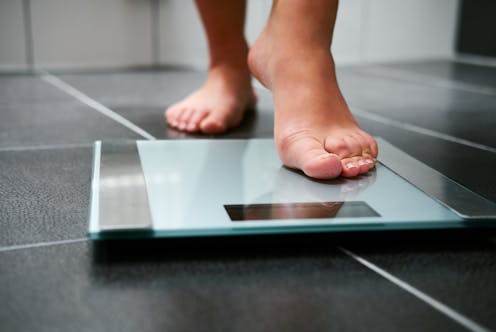When Christmas comes so do the kilos. New research tracks Australians' yo-yo weight gain
- Written by Ty Ferguson, Research Associate, University of South Australia

As we revel in much-cherished festive occasions and weekly get-togethers, Australians are unwittingly bearing an increasingly heavy cost – an expanding waistline.
Our new study[1] offers a new perspective on this. We asked 375 adults aged 18 to 65 years to wear a fitness tracker and weigh themselves, preferably daily but at least weekly. The research, published in JAMA Open Network, uncovers the subtle yet significant weight gain patterns of everyday Australians.
When we compare this new research with patterns from the northern hemisphere, it suggests it’s holidays and festive occasions – not just cooler weather – that drives weight gain. Australians show a yo-yo pattern of weight fluctuation that’s associated with poor weight control and poorer health overall.
Read more: The last 5 kilos really are the hardest to lose. Here’s why, and what you can do about it[2]
A global concern
Obesity is a major health concern worldwide. In Australia, an alarming two-thirds of adults are now overweight or obese[3]. On a global stage, we have some of the highest rates of excess weight and obesity – with OECD data ranking us 8th highest out of the 41 OECD countries based on the most recent data[4].
People who are overweight or have obesity are at an increased risk[5] of preventable chronic diseases such as heart disease, type 2 diabetes, certain cancers and depression and anxiety.
Recognising and understanding the factors that contribute to weight gain are the crucial first steps towards developing effective interventions. To explore this complex issue, we embarked on an in-depth exploration of how the weight of Australian adults fluctuates over a year. What we found was intriguing when compared to overseas studies.
Happy holidays and weighty weekends
Firstly, we noted a prominent weight gain during festive periods. Easter, a time of chocolate eggs and hot cross buns, saw a an average gain of about 244g (0.29% of average participant body weight). The Australian summer months associated with Christmas and New Year, feasts and festivities, had an even larger average increase of approximately 546g (0.65% of average participant body weight).
We also found a weekly cycle, with weight peaking on the weekend, when many people are likely letting their hair down after a busy work week and may be drinking and eating more.
While our study used total body weight, measured using scales, there are other options for tracking body composition. These include waist circumference, skin fold or bioelectric impedence. But these require differing levels of expertise to use.
Read more: I've indulged over the holidays. If I'm healthy the rest of the time, does it matter?[7]
How our weight pattern yo-yos
Seasonal variations were the most striking.
Unlike our counterparts in Europe[8] and the United States[9], who typically gain weight in winter and lose it in summer, Australians follow a more complex cycle.
Our study, the first to look at to examine changes in weight across a full calendar year in any southern hemisphere country, found Australians are heaviest in summer and lightest in autumn. Weight progressively increases in winter and early spring, only to dip at the end of spring. This pattern, akin to a yo-yo, diverges from the trends observed in the northern hemisphere, where winter overlaps with the common festive periods.
Frequent and significant weight cycling is problematic. It’s not just about the numbers on the scale; it’s the associated health risks that are concerning. Weight cycling, like “yo-yo dieting”, is linked to poor metabolic health[10] and long-term weight gain[11].
Small weight increases can add up each year. Those gains increase the risk of preventable chronic illness. In our study, approximately a quarter of participants finished the year 2% or more heavier than when they started – an average increase of 1.7kg.
A fresh opportunity
Mapping these “temporal hot spots” presents a unique opportunity to develop more targeted and effective interventions. The periods of weight gain identified in our study (weekends, festive periods and specific seasons) provide key points on the calendar where we could try to curb unhealthy weight fluctuations.
How do we use this information? A great first step would be to concentrate public health campaigns and personal weight management strategies on specific times of year.
Awareness campaigns before and during Christmas and winter could highlight the risks of obesity and provide tips for maintaining a balanced diet, moderate drinking, and staying active amid the festivities. Encouraging regular physical activity during colder months could also help offset seasonal weight gain.
Ultimately, messaging should focus on encouraging sustainable habits like healthy eating, regular exercise, and holistic wellbeing, rather than suggest drastic, short-term fixes. Our study offers an additional tool for creating weight-gain prevention strategies.
As we learn more about the social, cultural and behavioural influences on weight gain, we can tailor our interventions to be more effective.
It’s clear that our love for celebrations comes at a cost. But, armed with new insight, we can still enjoy these beloved traditions while also keeping our health in check. After all, good health is a gift in itself.
Read more: Exercise is even more effective than counselling or medication for depression. But how much do you need?[12]
References
- ^ study (jamanetwork.com)
- ^ The last 5 kilos really are the hardest to lose. Here’s why, and what you can do about it (theconversation.com)
- ^ two-thirds of adults are now overweight or obese (www.aihw.gov.au)
- ^ data (www.oecd-ilibrary.org)
- ^ an increased risk (pubmed.ncbi.nlm.nih.gov)
- ^ Shutterstock (www.shutterstock.com)
- ^ I've indulged over the holidays. If I'm healthy the rest of the time, does it matter? (theconversation.com)
- ^ Europe (pubmed.ncbi.nlm.nih.gov)
- ^ United States (pubmed.ncbi.nlm.nih.gov)
- ^ poor metabolic health (pubmed.ncbi.nlm.nih.gov)
- ^ long-term weight gain (pubmed.ncbi.nlm.nih.gov)
- ^ Exercise is even more effective than counselling or medication for depression. But how much do you need? (theconversation.com)

















